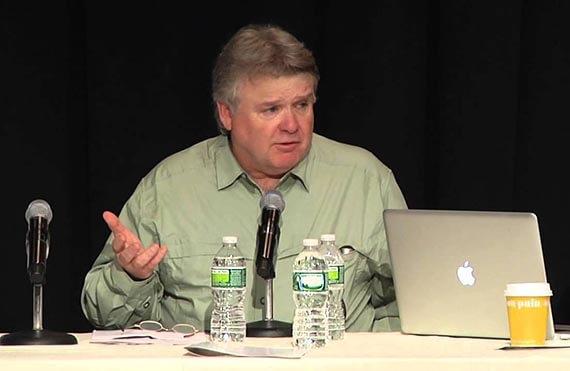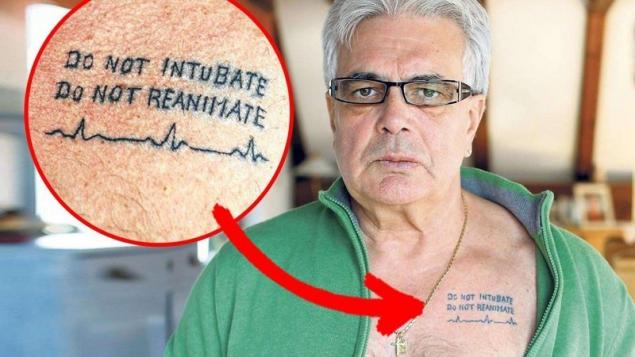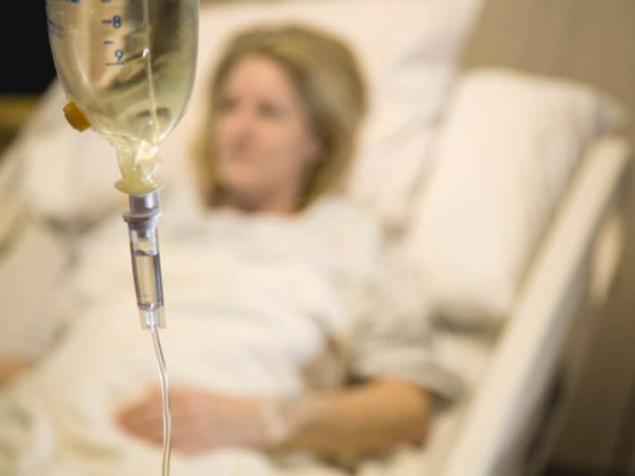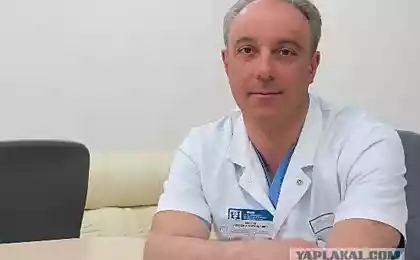827
Why do doctors, dying, refuse resuscitation
MD of Southern California Ken Murray explained why many doctors wear pendants with "Do not pump out" the inscription, and why they prefer to die at home from cancer

Let's go quietly
- Many years ago, Charlie, a respected orthopedic surgeon and my mentor, found himself in the stomach of some lump. He underwent a diagnostic operation. Confirmed pancreatic cancer.
Diagnosis is one of the country's top surgeons. He suggested Charlie treatment and operations, enabling triple the life span with such a diagnosis, although the quality of life at the same time it would be low.
Charlie are not interested. He was discharged from the hospital the next day, closed his practice and never again came to the hospital. Instead, he devoted all his time remaining family. His state of health was good, as far as possible in the diagnosis of cancer. Charlie was not treated with chemotherapy or radiation. A few months later, he died at home.
This topic is rarely discussed, but doctors also die. And they do not die as other people. It is amazing how rarely doctors to seek medical care when it is coming to an end. Doctors are fighting to the death, when it comes to their patients, but very relaxed about his own death. They know exactly what will happen. They know what options they have. They can not afford any kind of treatment. But they leave quietly.
Of course, doctors do not want to die. They want to live. But they know enough about modern medicine to understand the possibilities of the border. They also know enough about death to understand what people are most afraid of - death in agony and loneliness. Doctors talk about it with their families. The doctors want to be sure that when their time comes, no one will heroically save them from death, breaking ribs in an attempt to revive the chest compressions (and this is exactly what happens when the massage is done correctly).
Virtually all health care workers at least once witnessed a "futile treatment" when there was no probability that the terminally ill patient gets better from the latest advances in medicine. But the patient stabbed, it navtykivayut tubes connected to devices and poison drugs. This is what happens in intensive care and cost tens of thousands of dollars per day. For this money, people buy the suffering that we will not cause even terrorists.
Doctors do not want to die. They want to live. But they know enough about modern medicine to understand the possibilities of the border.
I lost count how many times my colleagues told me about the following: "Promise me that if you see me in this state, you're not going to do anything." They say this in all seriousness. Some doctors are pendants with the inscription "Do not siphon off" to the doctors did their chest compressions. I even saw one man who made himself a tattoo.
Treat the people, causing them suffering painfully. Doctors are taught not to show their feelings, but together they discuss that experience. "How can people so torturing their relatives?" - A question that has plagued many doctors. I suspect that a forced infliction of suffering patients at the request of families - one reason for the high percentage of alcoholism and depression among health professionals compared to other professions. For me personally, it was one of the reasons that I do not practice in the hospital the last ten years.
Doctor, do all
What happened? Why doctors prescribe treatments that they would never have registered themselves? The answer is simple or not - patients, doctors, and medical system as a whole
. The patient was stabbed, it navtykivayut tubes and poison drugs. This is what happens in intensive care and cost tens of thousands of dollars per day. For this money, people buy the suffering
Imagine this situation: the man lost consciousness, and he was taken by ambulance to the hospital. Nobody foresaw that scenario, so it was not stipulated in advance what to do in such a case. This situation is typical. Relatives scared, shocked and confused by the multiple treatment options. The head is spinning.
When the doctors asked, "Do you want us to" do everything "?" - Relatives say "yes." And hell begins. Sometimes the family really wants to "do it all", but most of the family just want everything was done within reason. The problem is that ordinary people often do not know - that it is reasonable and what is not. Confused and grieving, they may not ask or did not hear what the doctor says. But the doctor who ordered "to do everything" will do everything without thinking, reasonable it, or not.
Such situations happen all the time. The matter is aggravated sometimes completely unrealistic expectations about the "power of the" doctors. Many people think that an artificial heart massage - a sure way to intensive care, though most people still die or survive deep handicapped (if the brain is affected)
.
I took hundreds of patients who were brought to me in the hospital after resuscitation artificial heart massage. Only one of them, a healthy man with a healthy heart, left the hospital on his own two feet. If the patient is seriously ill, old, had a fatal diagnosis, the probability of a good outcome of intensive care is almost nonexistent, and the probability of suffering - almost 100%. Lack of knowledge and unrealistic expectations lead to bad decisions about treatment.
Of course, not only relatives of patients are to blame for the current situation. Doctors themselves do useless treatment possible. The problem is that even doctors who hate futile treatment, have to satisfy the wishes of patients and their relatives.
Stimulated causing suffering to patients at the request of families - one reason for the high percentage of alcoholism and depression among health professionals compared with other professions
Imagine relatives brought an elderly man with a poor prognosis in hospital, weeping and beating in hysterics. They first see a doctor who will treat them close. For them, it is - a mysterious stranger. In such circumstances it is extremely difficult to establish a relationship of trust. And if the doctor begins to discuss the issue of resuscitation, people tend to suspect him of unwillingness to fiddle with complicated case, saving money, or your time, especially if the doctor advises not to continue resuscitation.
Not all doctors know how to talk to patients in plain language. Someone very categorical, someone sins snobbery. But doctors are faced with similar problems. When I had to explain to the patient's family about the different treatment options before his death, as soon as possible I told them only about the opportunities that were reasonable under the circumstances.
If relatives offered unrealistic options, I'm a simple language to communicate to them all the negative consequences of such treatment. If the family still insisted on the treatment, which I thought was pointless and harmful, I offered to transfer them to the jurisdiction of another doctor or another hospital.
Doctors refuse to no treatment and retreatment of
Should I have been more insistent, urging families not to treat terminally ill patients? Some of the cases, when I refused to treat a patient, and gave them to other doctors, still haunt me.
One of my favorite patients was a lawyer of the famous political clan. She had a severe form of diabetes and disastrous circulation. At the foot - a painful injury. I tried to do everything to avoid hospitalization and surgery, knowing how dangerous the hospital and surgery for her.
She still went to another doctor, whom I did not know. One doctor almost did not know the medical history of the woman, so he decided to operate on her - trobmoznye shunt vessels on both legs. The operation did not help restore blood flow, and postoperative wound did not heal. On the feet go gangrene and amputated both legs woman. Two weeks later, she died in the famous hospital, where she was offered treatment.

And doctors and patients often become victims of a system that encourages over-treatment. Doctors in some cases receive a fee for each procedure, they do, so they do everything that is possible, regardless of whether a procedure will help, or hurt - just for the purpose of money. More often, though doctors are afraid that the patient's family to sue, so do everything you ask family, without expressing an opinion relatives of the patient, to avoid problems.
And doctors and patients often become victims of a system that encourages over-treatment. Doctors sometimes are paid for each procedure they do, so they do everything that is possible, regardless of whether the procedure will help or hurt
The system can devour the patient, even if it is pre-prepared and signed the necessary papers, which expressed their preferences about treatment before his death. One of my patients, Jack, was ill for many years and has gone through 15 major operations. He was 78. After all the twists and turns Jack unequivocally told me that never, under any circumstances, want to be on a ventilator.
One day Jack had a stroke. He was taken to hospital unconscious. Wives were not there. Doctors have done everything possible to be pumped out and transferred to intensive care, where connected to the ventilator. Jack feared that more than anything in my life! When I got to the hospital, then I discussed Jack's wishes with the staff and his wife. On the basis of documents drawn up with Jack and he signed, I was able to turn it on hardware that supports life. Then I just sat and sat with him. Two hours later, he died.
Despite the fact that Jack has made all the necessary documents, it is still not died the way he wanted. The system intervened. Moreover, as I learned later, one of the nurses naklyauznichala at me for what I am disabled by Jack devices, so - he committed murder. But as Jack ordered in advance all his wishes, I was nothing.
People who care for hospice live longer than people with the same disease who are treated in hospital
Still, the threat of a police investigation strikes fear into any doctor. It would be easier to leave Jack in the hospital equipment that is clearly contrary to his wishes. I would even earn more bucks, and the insurance company would have received a bill for an additional $ 500, 000. It is not surprising that doctors tend perelechivat.
But doctors are themselves still not perelechivayut. Every day they see the consequences of overtreatment. Almost everyone can find a way to die peacefully at home. We have many opportunities to ease the pain. Hospice care helps terminally ill people to spend the last days of his life comfortably and with dignity, rather than suffer from unnecessary treatment.
It is amazing that people who care for hospice live longer than people with the same disease who are treated in hospital. I was pleasantly surprised when I heard on the radio that the famous journalist Tom Wicker "died peacefully at home surrounded by family." Such cases are, thank God, are increasingly common.
Several years ago, my older cousin Torch (torch - flashlight, torch, Torch was born at home with the torch light) there was a spasm. As it turned out, he had lung cancer with brain metastases. I talked to different doctors, and we learned that the aggressive treatment, which meant three to five visits to the hospital for chemotherapy, he will live for about four months. Torch has decided not to be treated, he moved to live with me and only took pills from cerebral edema.
The next eight months, we have lived in pleasure, just like a child. For the first time we went to Disneyland. We sat at home and watched sports programs and eating what I cooked. Torch recovered even at home grub. He was not tormented by pain, and the spirit of the location of the battle was. One day he woke up. For three days he lay in a coma, and he died.
Torch was not a doctor, but he knew that he wanted to live, not to exist. Do not we all want the same? As for me personally, my doctor notified of my wishes. I'll go quietly into the night. As my mentor, Charlie. As my cousin Torch. As my fellow doctors.
Author: Anton Mikhailov

Let's go quietly
- Many years ago, Charlie, a respected orthopedic surgeon and my mentor, found himself in the stomach of some lump. He underwent a diagnostic operation. Confirmed pancreatic cancer.
Diagnosis is one of the country's top surgeons. He suggested Charlie treatment and operations, enabling triple the life span with such a diagnosis, although the quality of life at the same time it would be low.
Charlie are not interested. He was discharged from the hospital the next day, closed his practice and never again came to the hospital. Instead, he devoted all his time remaining family. His state of health was good, as far as possible in the diagnosis of cancer. Charlie was not treated with chemotherapy or radiation. A few months later, he died at home.
This topic is rarely discussed, but doctors also die. And they do not die as other people. It is amazing how rarely doctors to seek medical care when it is coming to an end. Doctors are fighting to the death, when it comes to their patients, but very relaxed about his own death. They know exactly what will happen. They know what options they have. They can not afford any kind of treatment. But they leave quietly.
Of course, doctors do not want to die. They want to live. But they know enough about modern medicine to understand the possibilities of the border. They also know enough about death to understand what people are most afraid of - death in agony and loneliness. Doctors talk about it with their families. The doctors want to be sure that when their time comes, no one will heroically save them from death, breaking ribs in an attempt to revive the chest compressions (and this is exactly what happens when the massage is done correctly).
Virtually all health care workers at least once witnessed a "futile treatment" when there was no probability that the terminally ill patient gets better from the latest advances in medicine. But the patient stabbed, it navtykivayut tubes connected to devices and poison drugs. This is what happens in intensive care and cost tens of thousands of dollars per day. For this money, people buy the suffering that we will not cause even terrorists.
Doctors do not want to die. They want to live. But they know enough about modern medicine to understand the possibilities of the border.
I lost count how many times my colleagues told me about the following: "Promise me that if you see me in this state, you're not going to do anything." They say this in all seriousness. Some doctors are pendants with the inscription "Do not siphon off" to the doctors did their chest compressions. I even saw one man who made himself a tattoo.
Treat the people, causing them suffering painfully. Doctors are taught not to show their feelings, but together they discuss that experience. "How can people so torturing their relatives?" - A question that has plagued many doctors. I suspect that a forced infliction of suffering patients at the request of families - one reason for the high percentage of alcoholism and depression among health professionals compared to other professions. For me personally, it was one of the reasons that I do not practice in the hospital the last ten years.
Doctor, do all
What happened? Why doctors prescribe treatments that they would never have registered themselves? The answer is simple or not - patients, doctors, and medical system as a whole
. The patient was stabbed, it navtykivayut tubes and poison drugs. This is what happens in intensive care and cost tens of thousands of dollars per day. For this money, people buy the suffering
Imagine this situation: the man lost consciousness, and he was taken by ambulance to the hospital. Nobody foresaw that scenario, so it was not stipulated in advance what to do in such a case. This situation is typical. Relatives scared, shocked and confused by the multiple treatment options. The head is spinning.
When the doctors asked, "Do you want us to" do everything "?" - Relatives say "yes." And hell begins. Sometimes the family really wants to "do it all", but most of the family just want everything was done within reason. The problem is that ordinary people often do not know - that it is reasonable and what is not. Confused and grieving, they may not ask or did not hear what the doctor says. But the doctor who ordered "to do everything" will do everything without thinking, reasonable it, or not.
Such situations happen all the time. The matter is aggravated sometimes completely unrealistic expectations about the "power of the" doctors. Many people think that an artificial heart massage - a sure way to intensive care, though most people still die or survive deep handicapped (if the brain is affected)
.

I took hundreds of patients who were brought to me in the hospital after resuscitation artificial heart massage. Only one of them, a healthy man with a healthy heart, left the hospital on his own two feet. If the patient is seriously ill, old, had a fatal diagnosis, the probability of a good outcome of intensive care is almost nonexistent, and the probability of suffering - almost 100%. Lack of knowledge and unrealistic expectations lead to bad decisions about treatment.
Of course, not only relatives of patients are to blame for the current situation. Doctors themselves do useless treatment possible. The problem is that even doctors who hate futile treatment, have to satisfy the wishes of patients and their relatives.
Stimulated causing suffering to patients at the request of families - one reason for the high percentage of alcoholism and depression among health professionals compared with other professions
Imagine relatives brought an elderly man with a poor prognosis in hospital, weeping and beating in hysterics. They first see a doctor who will treat them close. For them, it is - a mysterious stranger. In such circumstances it is extremely difficult to establish a relationship of trust. And if the doctor begins to discuss the issue of resuscitation, people tend to suspect him of unwillingness to fiddle with complicated case, saving money, or your time, especially if the doctor advises not to continue resuscitation.
Not all doctors know how to talk to patients in plain language. Someone very categorical, someone sins snobbery. But doctors are faced with similar problems. When I had to explain to the patient's family about the different treatment options before his death, as soon as possible I told them only about the opportunities that were reasonable under the circumstances.
If relatives offered unrealistic options, I'm a simple language to communicate to them all the negative consequences of such treatment. If the family still insisted on the treatment, which I thought was pointless and harmful, I offered to transfer them to the jurisdiction of another doctor or another hospital.
Doctors refuse to no treatment and retreatment of
Should I have been more insistent, urging families not to treat terminally ill patients? Some of the cases, when I refused to treat a patient, and gave them to other doctors, still haunt me.
One of my favorite patients was a lawyer of the famous political clan. She had a severe form of diabetes and disastrous circulation. At the foot - a painful injury. I tried to do everything to avoid hospitalization and surgery, knowing how dangerous the hospital and surgery for her.
She still went to another doctor, whom I did not know. One doctor almost did not know the medical history of the woman, so he decided to operate on her - trobmoznye shunt vessels on both legs. The operation did not help restore blood flow, and postoperative wound did not heal. On the feet go gangrene and amputated both legs woman. Two weeks later, she died in the famous hospital, where she was offered treatment.

And doctors and patients often become victims of a system that encourages over-treatment. Doctors in some cases receive a fee for each procedure, they do, so they do everything that is possible, regardless of whether a procedure will help, or hurt - just for the purpose of money. More often, though doctors are afraid that the patient's family to sue, so do everything you ask family, without expressing an opinion relatives of the patient, to avoid problems.
And doctors and patients often become victims of a system that encourages over-treatment. Doctors sometimes are paid for each procedure they do, so they do everything that is possible, regardless of whether the procedure will help or hurt
The system can devour the patient, even if it is pre-prepared and signed the necessary papers, which expressed their preferences about treatment before his death. One of my patients, Jack, was ill for many years and has gone through 15 major operations. He was 78. After all the twists and turns Jack unequivocally told me that never, under any circumstances, want to be on a ventilator.
One day Jack had a stroke. He was taken to hospital unconscious. Wives were not there. Doctors have done everything possible to be pumped out and transferred to intensive care, where connected to the ventilator. Jack feared that more than anything in my life! When I got to the hospital, then I discussed Jack's wishes with the staff and his wife. On the basis of documents drawn up with Jack and he signed, I was able to turn it on hardware that supports life. Then I just sat and sat with him. Two hours later, he died.
Despite the fact that Jack has made all the necessary documents, it is still not died the way he wanted. The system intervened. Moreover, as I learned later, one of the nurses naklyauznichala at me for what I am disabled by Jack devices, so - he committed murder. But as Jack ordered in advance all his wishes, I was nothing.
People who care for hospice live longer than people with the same disease who are treated in hospital
Still, the threat of a police investigation strikes fear into any doctor. It would be easier to leave Jack in the hospital equipment that is clearly contrary to his wishes. I would even earn more bucks, and the insurance company would have received a bill for an additional $ 500, 000. It is not surprising that doctors tend perelechivat.
But doctors are themselves still not perelechivayut. Every day they see the consequences of overtreatment. Almost everyone can find a way to die peacefully at home. We have many opportunities to ease the pain. Hospice care helps terminally ill people to spend the last days of his life comfortably and with dignity, rather than suffer from unnecessary treatment.
It is amazing that people who care for hospice live longer than people with the same disease who are treated in hospital. I was pleasantly surprised when I heard on the radio that the famous journalist Tom Wicker "died peacefully at home surrounded by family." Such cases are, thank God, are increasingly common.
Several years ago, my older cousin Torch (torch - flashlight, torch, Torch was born at home with the torch light) there was a spasm. As it turned out, he had lung cancer with brain metastases. I talked to different doctors, and we learned that the aggressive treatment, which meant three to five visits to the hospital for chemotherapy, he will live for about four months. Torch has decided not to be treated, he moved to live with me and only took pills from cerebral edema.
The next eight months, we have lived in pleasure, just like a child. For the first time we went to Disneyland. We sat at home and watched sports programs and eating what I cooked. Torch recovered even at home grub. He was not tormented by pain, and the spirit of the location of the battle was. One day he woke up. For three days he lay in a coma, and he died.
Torch was not a doctor, but he knew that he wanted to live, not to exist. Do not we all want the same? As for me personally, my doctor notified of my wishes. I'll go quietly into the night. As my mentor, Charlie. As my cousin Torch. As my fellow doctors.
Author: Anton Mikhailov























